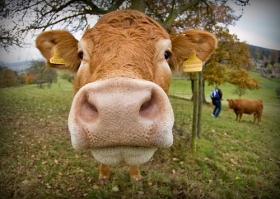Cash Cows: Farm Converts Cattle Manure into Electricity

A Vermont dairy farm is producing something other than milk. Earlier this month, state officials were on hand to visit Vermontís newest methane facility. Westminster Farms Inc., along with Green Mountain Power (GMP), have been working together in an on-site plant that converts methane gas released from cow manure into electricity.
Cow manure is one of the largest contributors to greenhouse gasses and the runoff from manure pollutes water. Taking a liability and converting it into an asset just made environmental and economic sense to the farmís Shawn Goodell.
An anaerobic digester is used to mix, heat and break down the manure. The raw manure and ag substrates produce methane biogas, which is captured and then generates electricity. And with an estimated 1,200 cows on the Westminster-based dairy farm, finding a supply of manure is not a problem.
Liquid waste will be used as fertilizer. Leftover solids will be used as cattle bedding, saving the farm about $80,000 on the cost of sawdust. And that is good news, especially considering the state of the economy. Like other businesses and industries, the dairy industry is also feeling the pinch.
It is estimated that less than 1,100 dairy farms remain in Vermont. Thatís about 300 less than five years ago.
While the technology is not new to Vermont, Westminster Farms is the latest dairy farm in Vermont to convert methane into energy. Westminster Farms will receive a fixed price per kilowatt hour generated. Since July, the project has been producing about 225 kilowatts of electricity, enough to power about 250 homes on a daily basis. GMC customers will be given the option of purchasing the renewable energy.
The project took about three years to bring to fruition. Funding for the $1.5 million project was a collaborative effort between both state and federal agencies. According to the GMP press release, Westminster Farms invested about $700, 000 and Vermont-based Green Mountain Power committed $175, 000. Other agencies involved in funding the endeavor included the U.S. Department of Agriculture (USDA), Vermont Department of Agriculture, Vermont Agricultural Credit Corporation (VACC) and Vermont Clean Energy Development Fund.